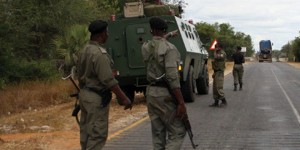 Speaking to reporters immediately after the meeting, the spokesperson for the Commission, and head of the government delegation, former security minister Jacinto Veloso, said that Renamo wanted to correct alleged “irregularities†that had occurred during the implementation of the 1992 peace agreement.
Speaking to reporters immediately after the meeting, the spokesperson for the Commission, and head of the government delegation, former security minister Jacinto Veloso, said that Renamo wanted to correct alleged “irregularities†that had occurred during the implementation of the 1992 peace agreement.
The meeting, he added, agreed that Renamo “will present a proposal for correcting the supposed irregularities and errors of application of the peace accord for the integration, or reintegration or confirmation of the integration of members of Renamo, particularly in the FADMâ€.
Veloso insisted that implementing any proposals made by Renamo must observe the fundamental laws referring to the defence of all Mozambicans, regardless of their ethnic or religious affiliation or their political party preferences.
It was a basic principle, he said, that the defence and security forces should “in all their actions defend the national interest of the state, the interest of all Mozambicansâ€. A second principle was that they are non-party political bodies and should refrain from any attitude which could damage the country.
It is not yet clear what “irregularities†Renamo has in mind. The government has in the past insisted that everything in the peace accord was fully implemented.
The section in the accord on forming the FADM stated that the new, unified armed forces would consist of 30,000 men – 15,000 from the old government army, the FAM/FPLN, and 15,000 from Renamo. But the accord also said that all these troops must be volunteers – and there were nowhere near 30,000 volunteers.
Attempts to pressgang men into the FADM only made matters worse, and in mid-1994 a wave of mutinies erupted across the assembly points where the Renamo and government fighters were waiting to be demobilized. Both armies disintegrated in a welter of violence.
The hopes for a large army crumbled away as both the government and Renamo were forced to accept that they simply did not have enough volunteers. The Supervisory and Control Commission (CSC), which oversaw implementation of the peace agreement, decided to abandon the principle of parity and accept into the FADM all those who wished to volunteer. Both the government and the Renamo representatives on the CSC agreed to this.
So, when the UN-chaired commission on setting up the FADM finished its work in December 1994, the FADM consisted of just 11,579 men, with more officers than privates. About two thirds came from the FAM/FPLM and one third from Renamo.
Subsequently, there was no further attempt to recruit troops on a political basis. Instead, the FADM has grown through conscription. Under the law on military service, all Mozambicans must register for the FADM in the year of their 18th birthday. Budgetary and logistical constraints ensure that only a small number are actually recruited.
There was nothing in the peace accord about recruiting Renamo members into the police (or into the intelligence service, SISE). However, one clause stated that Renamo would be responsible for the protection of its own leaders, and these bodyguards would enjoy police status. This was the origin of the current Renamo militia.
But that clause was time bound – it was one of a series of “transitional guarantees†valid only from the ceasefire to the first general elections (October 1994). After those elections, Renamo was told that political parties could not have their own private armies.
Renamo leader Afonso Dhlakama agreed, and said the police could take over his security, provided his men were allowed to join the police. The government asked for a list of bodyguards whom Renamo would submit to police training.
After considerable delay, the list was provided, but the government insisted that, once trained as policemen, these men must obey police orders. As the then Prime Minister, Pascoal Mocumbi, put it, “People cannot be trained as policemen and then take orders from the Renamo central committeeâ€.
Dhlakama did not accept this, and in January 1998, he categorically refused to allow his bodyguards to be incorporated into the police. That is why no members of the Renamo security force have ever been recruited into the police.
The possibility was opened again with the September 2014 agreement, signed by Dhlakama and the then president Armando Guebuza, which temporarily halted the Renamo insurrection. Under that agreement the Renamo gunmen were to be incorporated into the FADM or the police, or sent back onto civilian life. That all depended on Renamo providing a new list of all those whom it wanted to sent into the army or police, and it never did so.
As for the previous points on the Joint Commission’s agenda, the Renamo proposals on decentralization (including a constitutional amendment on how provincial governors should be appointed) have been deposited with a sub-commission. They have not yet been made public.
There has been no movement on securing a cessation of hostilities. Renamo has rejected proposals for a truce until the government withdraws its forces from the Gorongosa mountain range, near the bush camp where Dhlakama currently has its headquarters. The government refuses to make any such unilateral withdrawal, arguing that its forces are there to protect the population from Renamo attacks.
The Joint Commission is scheduled to meet again on Wednesday.
Post published in: Africa News

